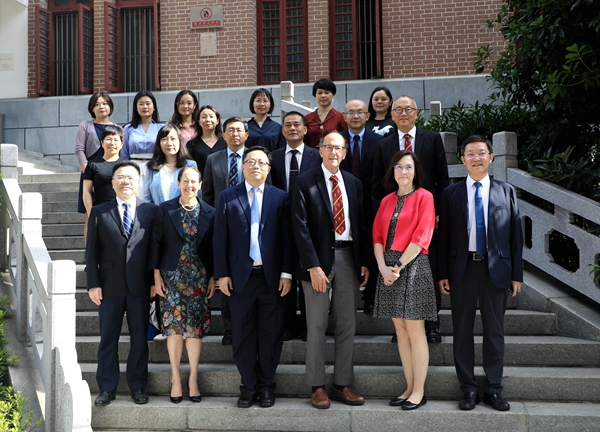A 6-member delegation from the China Medical Board (CMB) of the United States, led by Chair Wendy O'Neill and President Roger I. Glass, visited Xiangya Hospital of Central South University on July 23. Chen Xiang, Managing Vice President of Central South University, Dean of Xiangya School of Medicine, and Director of Furong Laboratory, Li Zhihong, Vice President of Central South University and President of the Second Xiangya Hospital, as well as other leaders of relevant units such as Xiangya Hospital and the Third Xiangya Hospital, participated in the discussion with the CMB delegation around global health, medical education, clinical research, and other topics.

The association between Xiangya Hospital and CMB can be traced back to 1914, with the friendship between the two parties having spanned over a century, becoming stronger than ever. In the new era. CMB has remained one of the most significant international funding bodies for teaching and research in medical and related fields at Central South University. Since the establishment of the first counterpart fund by CMB at Central South University in 1981, it has supported 88 projects with a total funding of approximately $15.318 million. Since the initiation of the Open Competition (OC) project in 2011, Central South University has been approved for 23 projects, receiving a total fund of $2.16 million. In the past four decades, Xiangya Hospital and CMB have cooperated in various areas including medical education, residency training, global health, and research projects for young scholars. Xiangya Hospital, as one of the seven founding institutions, co-established with CMB the China Consortium of Elite Teaching Hospitals for Residency Education.
Wendy O'Neill, on behalf of the CMB delegation, expressed gratitude for the warm reception from Xiangya. She highlighted that Xiangya is one of the major partners for CMB and that both parties will celebrate their 110th anniversary next year. The visit aimed to review the cooperation achievements of the past four decades and to discuss future strategic planning. Roger I. Glass shared his experiences of working at the Centers for Disease Control and Prevention (CDC) and the National Institutes of Health (NIH) in the United States since 1977, as well as his collaboration with China. He emphasized that talent cultivation and scientific research recognized no boundaries and are critical for shaping the future. He expressed his desire to maintain and deepen the ties with Chinese partners like Xiangya and to jointly conduct cutting-edge research. This effort, he hoped, would contribute significantly to the training of successive generations of medical scientists and leaders.
Chen Xiang shared a brief overview of the current status and recent successes of Xiangya School of Medicine, emphasizing the important and ongoing relationship with CMB as one of its most valuable international partners. He expressed enthusiasm for future collaborations in areas such as global health, medical education, clinical research, and the integration of innovative technologies like AI into medical practices. The goal of these partnerships is to generate creative, impactful results that contribute to the worldwide medical and healthcare community, and to further the development of a "community of human health.”
Dr. Xiao Yi, a selectee of the CMB-University of Washington Global Health Talent Degree Program, and a dermatologist at Xiangya Hospital, as a representative of young scholars receiving CMB funding, recounted the history of collaboration between Xiangya and CMB, highlighting recent key projects. These include initiatives to enhance patient safety management in Africa, the creation of online platforms for skin disease diagnosis and treatment, the development of computer simulation training systems for neurosurgery, training programs for competence development of child psychiatry physicians, and collaborative international efforts in neonatology.
Participants in the discussion included CMB Liaison Officer from Central South University, principal investigators of CMB projects and team members from Xiangya Hospital, the Second Xiangya Hospital, Xiangya School of Nursing, and Xiangya School of Public Health.
(First review: Zhang Xu. Second review: Han Yan. Third review: Li Yin)
Source: Xiangya Hospital
Authors: Peng Bihua, Long Chang. Photography: Wang Quanquan
Original article link:https://news.csu.edu.cn/info/1006/156585.htm
